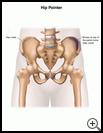
Hip Pointer
________________________________________________________________________
KEY POINTS
- A hip pointer is a bruise of the bones, muscles, or other soft tissue in the hip.
- The pain from a hip pointer usually goes away in a few weeks with self-care. Your provider may recommend stretching and exercises to help you heal. In some cases, your provider may give you a shot of steroid medicine.
- To help relieve pain, take nonprescription pain medicine and use an ice pack. Put padding over the injured area to help keep it from getting hurt again.
________________________________________________________________________
What is a hip pointer?
A hip pointer is a bruise of the bones in your hip or a bruise of the muscles and other soft tissue in the hip.
What is the cause?
A hip pointer is caused by a direct blow to the hip. This injury happens most often in a contact sport, such as football, when someone lands on the hip or drives a helmet into the hip.
What are the symptoms?
Symptoms may include:
- Pain and tenderness in the hip
- Trouble walking
- A soft lump, swelling, or bruising around the hip
How is it diagnosed?
Your healthcare provider will ask about your symptoms and how the injury happened. Your provider will examine your hip. Tests may include:
- X-rays
- CT scan, which uses X-rays and a computer to show detailed pictures of the bones
- MRI, which uses a strong magnetic field and radio waves to show detailed pictures of the bones
How is it treated?
The pain from a hip pointer usually goes away in a few weeks with self-care. Your provider may recommend stretching and exercises to help you heal. In some cases, your provider may give you a shot of steroid medicine.
How can I take care of myself?
To help relieve pain for the first few days after the injury:
- Put an ice pack, gel pack, or package of frozen vegetables wrapped in a cloth on the injured area every 3 to 4 hours for up to 20 minutes at a time.
- Take an anti-inflammatory medicine, such as ibuprofen, or other medicine as directed by your provider. Nonsteroidal anti-inflammatory medicines (NSAIDs), such as ibuprofen, may cause stomach bleeding and other problems. These risks increase with age. Read the label and take as directed. Unless recommended by your healthcare provider, you should not take this medicine for more than 10 days.
Put padding over the injured area to help keep it from getting hurt again.
Follow your healthcare provider's instructions. Ask your provider:
- How and when you will get your test results
- How long it will take to recover
- If there are activities you should avoid and when you can return to your normal activities
- How to take care of yourself at home
- What symptoms or problems you should watch for and what to do if you have them
Make sure you know when you should come back for a checkup. Keep all appointments for provider visits or tests.
How can I help prevent a hip pointer?
A hip pointer is hard to prevent. However, if you are playing a contact sport, wearing proper protective padding over this area of your body may help to prevent injury.

